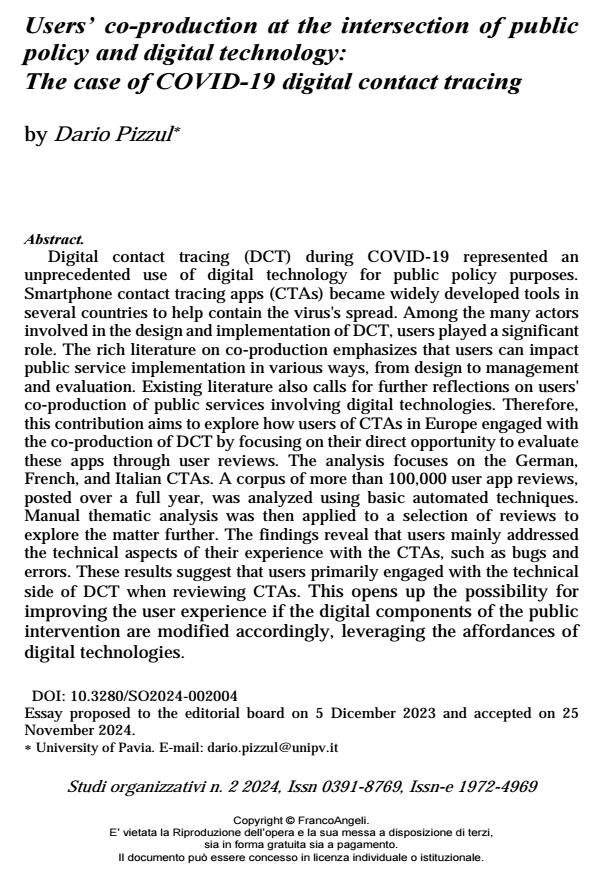Users’ co-production at the intersection of public policy and digital technology: The case of COVID-19 digital contact tracing
Journal title STUDI ORGANIZZATIVI
Author/s Dario Pizzul
Publishing Year 2025 Issue 2024/2
Language English Pages 27 P. 73-99 File size 514 KB
DOI 10.3280/SO2024-002004
DOI is like a bar code for intellectual property: to have more infomation
click here
Below, you can see the article first page
If you want to buy this article in PDF format, you can do it, following the instructions to buy download credits

FrancoAngeli is member of Publishers International Linking Association, Inc (PILA), a not-for-profit association which run the CrossRef service enabling links to and from online scholarly content.
Digital contact tracing (DCT) during COVID-19 represented an unprecedented use of digital technology for public policy purposes. Smartphone contact tracing apps (CTAs) became widely developed tools in several countries to help contain the virus's spread. Among the many actors involved in the design and implementation of DCT, users played a significant role. The rich literature on co-production emphasizes that users can impact public service implementation in various ways, from design to management and evaluation. Existing literature also calls for further reflections on users' co-production of public services involving digital technologies. Therefore, this contribution aims to explore how users of CTAs in Europe engaged with the co-production of DCT by focusing on their direct opportunity to evaluate these apps through user reviews. The analysis focuses on the German, French, and Italian CTAs. A corpus of more than 100,000 user app reviews, posted over a full year, was analyzed using basic automated techniques. Manual thematic analysis was then applied to a selection of reviews to explore the matter further. The findings reveal that users mainly addressed the technical aspects of their experience with the CTAs, such as bugs and errors. These results suggest that users primarily engaged with the technical side of DCT when reviewing CTAs. This opens up the possibility for improving the user experience if the digital components of the public intervention are modified accordingly, leveraging the affordances of digital technologies.
Keywords: digital contact tracing; contact tracing apps; COVID-19; co-production; public policy; technology design.
Dario Pizzul, Users’ co-production at the intersection of public policy and digital technology: The case of COVID-19 digital contact tracing in "STUDI ORGANIZZATIVI " 2/2024, pp 73-99, DOI: 10.3280/SO2024-002004